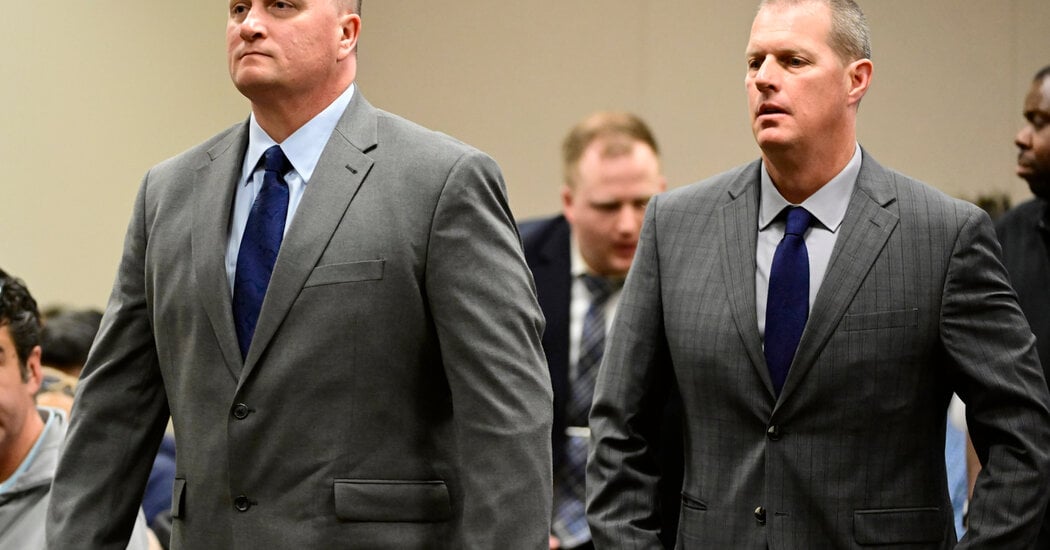Two Colorado paramedics were convicted of criminally negligent homicide in the 2019 death of Elijah McClain, a young unarmed Black man whose case drew national attention and forced public safety reforms in the city where he lived and died.
A mostly white jury found the paramedics, Peter Cichuniec and Jeremy Cooper, guilty of a more serious charge they faced. But the jury split on two lesser assault charges: They cleared Mr. Cooper of both assault charges, but convicted Mr. Cichuniec of one of those charges, second-degree assault for the unlawful administration of drugs.
The men had injected Mr. McClain with the powerful sedative ketamine while he was in police custody in Aurora, Colo., which doctors said left him near death. He died days later in the hospital.
The trial was a rare prosecution of paramedics, and raised the question of the role that medical personnel play in police encounters and whether they could be held criminally responsible for their actions.
Rage bait not in the article (since it’s just talking about the two paramedic’s sentence):
Context of the arrest:
911 call because McClain was wearing a ski mask and flailing arms, though caller noted he didn’t think McClain was armed nor anyone in immediate danger.
McClain wore a ski mask due to a blood circulation issue that caused him to easily feel chilly.
Friends believe he was ‘flailing his arms’ because he was probably dancing to music.
McClain was near his house.The arrest of McClain:
Officers slammed McClain into a wall when they apprehended him
Officers claimed to hear another shout “He is going for your gun!”
Later accounts had differed as to which officer’s gun he was going for (they didn’t match between each other).
A body cam supposedly knocked off during the struggle was picked back up but dropped again with someone saying “leave it there”
Another officer can be heard telling another to move his camera, which the family’s attorney believed was to try to support their claim that he was going for a gun and so it couldn’t catch the interaction and show he did not go for a gun.
For 15 minutes, 3 officers held down 5’4" 140 lbs. McClain as he apologized, vomited, apologized for vomiting and said that he couldn’t breath right.
Officer Woodyard applied a carotid control hold which cuts off blood flow to the brain to render McClain unconscious.
One officer threatened that he would have his police dog bite him as he already lay handcuffed and pinned.
An officer tells newly arrived officers that McClain was “acting crazy” and was “definitely on something” and that he attacked them using “incredible, crazy strength”The death of McClain:
Paramedics injected McClain with 500 mg of ketamine to sedate him though the local protocols only called for 320 - 350 mg for someone McClain’s weight.
The injection caused him to stop breathing and was brain dead.
Photos were discovered of officers posing inappropriately and reenacting the carotid control hold taken at the site that he was detained and assaulted.The coroner
Aurora PD met with the county coroner prior to the coroner making his final decision on cause of death.
Aurora PD investigators were present for the autopsy itself.
The coroner’s decision on cause of death was “undetermined”
The coroner opined that his death could have been caused by McClain’s own physical assertion comibed with a supposed narrow coronary artery or if he had an asthma attack or choked on his own vomit.
The coroner opined that it wasn’t clear if the officer’s actions contributed to any of it and that McClain was given a “therapeutic level” of ketamine.
A later coroner report obtained through a lawsuit listed the cause of death now as “complications of ketamine administration following forcible restraint” though officially remains “undetermined” due to that being the reason on the initial report.The protest organizers:
Protest organizers were charged by AuroraPD ranging from inciting riot to kidnapping.
One organizer, Northam, was arrested with the aid of SWAT and an armored vehicle.
Roberts was arrested while jogging.
Others were arrested at home or at work.
Charges for everyone was eventually dismissed or dropped.The officers:
After the photo was discovered, one officer resigned and the other three were fired.
Roesenblatt, was fired because he responded “ha ha” to the photos in a text message.
Roedema was found guilty of negligent homicide and assault.
Roesenblatt was acquitted of all charges.
Woodyard was acquitted of all charges and returned to working as a police officer for Aurora PD in November of 2023 and will be receiving $212,546.04 in backpay (backpay from September 2021 until he was reinstated).The paramedics:
As mentioned in the article, two paramedics were convicted of negligent homicide.Thank you for your diligence
They were certainly negligent in not properly assessing McClain (who was already restrained) prior to ketamine admin. Once ketamine was given, they then also failed to monitor and recognize cardiac arrest.
This case will likely lead to change in paramedic emergency care protocols.
I sort of feel sorry for the paramedics in the sense that they were too complacent and should have told the cops “no” when they tried to dictate patient care (as in, ‘you need to sedate this dangerous person’). I work in healthcare too, so I’m familiar with cops trying to dictate medical care and the importance of advocating for your pt when that happens. It can be intimidating to tell a cop to fuck off, but sometimes you have to do it. If nothing else, it’s your ass on the line.
Ketamine makes you go night night and forget to breathe. Probably not a good idea to inject someone with it without a way to protect their airway.
Not to mention they never did an evaluation, they never checked vital signs, they didn’t do any attempt at administering this medication safely. They fucked up utterly and completely. So did the cops. So did the fucker that called 911. Society let this young man down every step of the way.
I’m out of the loop – what did the 911 caller do?
Called the cops bc he was wearing a ski mask and therefore looked suspicious
*outside walking while it was cold.
Made a phone call that got a completely innocent person killed.
Wouldn’t there be other more appropriate medications to calm someone without the possibility respitory arrest? Something like Xanax or Ativan for example? Not a pharmacist but Ketamine seems kinda hardcore.
This may be completely wrong but I’m guessing ketamine so they can inject it rather than waiting on non injection medication. I’m not sure if the other two can be injected or if available but it was a thought I had for reasoning. Not that any of this situation was handled with reasoning, it’s another tragedy in a long list of them. I have enough anxiety myself I can’t imagine what that poor guy went through in his final moments.
Benzos have their issues, but I’d probably go there in case of something like a postictal psychosis, with Haldol being a second line. Ketamine and PCP have a similar mechanism of action, so it doesn’t feel like a great med for someone with psychosis, but I’m also not a doctor or nurse, I just play one on
TVthe Internet.Paramedic here, we don’t have access to a fully stocked pharmacy in our ambulance. Ketamine is pretty much the industry standard for situations like this. Its efficacy, safety profile, wide dose range, and rapid onset make it the ideal drug for managing violent behavior and sedation in a prehospital setting. I am not saying the medics made an appropriate decision in this situation but that is the appropriate mediation to use in situations like this. Versed would be a good runner up but is less effective in some situations with low doses and higher doses have a higher risk of respiratory compromise. Ativan is an option, if they carry it, I wouldn’t personally use Ativan in this situation because it has a longer onset/duration and higher chance of adverse reactions.
Ketamine might seem a bit excessive but it’s a very good medication for prehospital use. This is a situation that a lot of stuff went wrong and someone died. The cause of the death is more likely an adverse reaction that was not appropriate addressed by the paramedic, but that’s probably why they just got a conviction. But ketamine is used every day across the US without situations like this happening.






